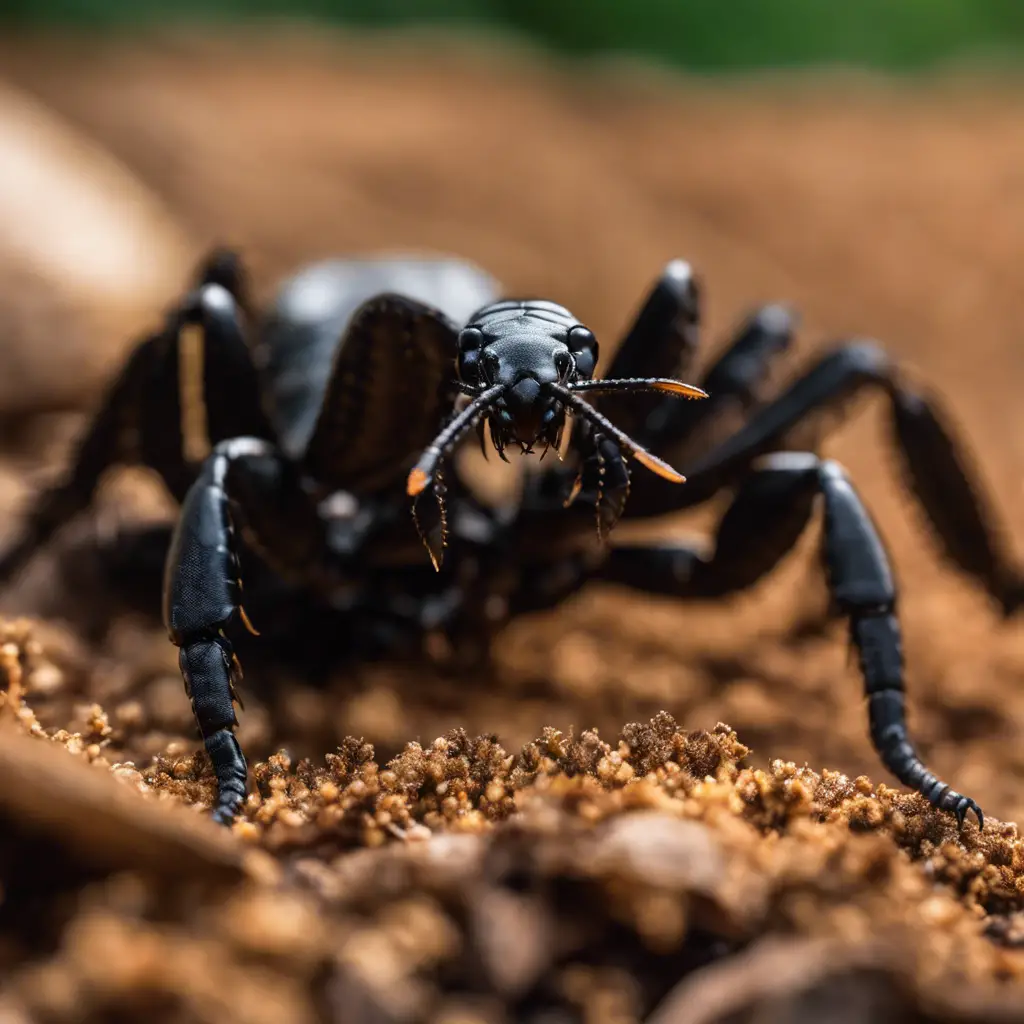As a seasoned entomologist with a passion for studying unique arachnid species, I have always been intrigued by the lesser-known scorpions of Pennsylvania. Despite not being a typical habitat for scorpions, my experience has shown me that Pennsylvania harbors some truly fascinating species waiting to be discovered.
I believe that exploring the surprising diversity of scorpions in this state can offer a thrilling adventure for any nature enthusiast. Join me as we delve into the world of Pennsylvania scorpions and uncover the hidden gems of their intriguing characteristics.
Key Takeaways
- Pseudoscorpions are the most common scorpion-like arachnids in Pennsylvania.
- Pseudoscorpions lack venomous tails, making them harmless to humans.
- These tiny creatures contribute to pest control by preying on insects like moth larvae and ants.
- Pennsylvania’s environment is safe as it lacks venomous scorpions due to its non-arid climate.
Diversity of Scorpion Species in Pennsylvania

Though Pennsylvania isn’t known for its arid climate conducive to scorpions, the state boasts a diverse range of scorpion-like arachnids, particularly the Pseudoscorpion. Unlike traditional scorpions, Pseudoscorpions in Pennsylvania are tiny scorpion species that lack a venomous tail, making them harmless to humans.
These small arachnids play a crucial role in pest control by preying on moth larvae, ants, and mites. Despite their scorpion-like appearance, Pseudoscorpions have unique hunting mechanisms, including stalking and using poison glands for prey paralysis.
Pennsylvania hosts various Pseudoscorpion species well-adapted to coexist with humans, contributing significantly to controlling insect populations in the state. So, while traditional scorpions may be rare, the presence of these tiny scorpion species enriches Pennsylvania’s arachnid biodiversity.
Habitats Where Scorpions Are Found

Scorpions inhabit a variety of habitats, ranging from arid deserts to lush forests and even urban areas. They can be found in diverse environments due to their adaptability and resilience. Here are some key habitats where scorpions are commonly found:
- Sandy deserts with rock crevices
- Grasslands with dry soil
- Forests with ample debris and undergrowth
- Urban areas with suitable shelter options
Scorpions seek out these habitats to hunt for small insects, their primary source of food. Even the tiny scorpion species have specialized ways to survive in these varied environments, demonstrating their ability to thrive in different ecological niches.
Behaviors of Pennsylvania Scorpions

Within the varied habitats Pennsylvania scorpions inhabit, their nocturnal behavior patterns reveal intriguing insights into their survival strategies and interactions within their ecosystem.
These scorpions are most active during the night, using this time to hunt for prey and avoid potential predators. They exhibit territorial behaviors, marking their territories with pheromones to establish boundaries and attract potential mates.
Pennsylvania scorpions are skilled at capturing prey using their powerful pincers and venomous stingers, swiftly immobilizing their victims. Additionally, they’re adept at burrowing and creating underground shelters to escape harsh weather conditions and protect themselves from threats.
Observing these behaviors provides valuable information about the unique adaptations and strategies these scorpions have developed to thrive in their environment.
Identifying Scorpions in Pennsylvania

In Pennsylvania, identifying scorpions can be a challenge due to the state’s non-arid climate. However, you might come across tiny creatures that resemble scorpions but are actually Pseudoscorpions. Here are some characteristics to help you differentiate them:
- Pseudoscorpions have segmented teardrop-shaped bodies.
- They possess eight legs, similar to true scorpions.
- Pseudoscorpions have large pincers relative to their tiny size.
- These scorpion-like creatures are commonly found in dark areas of homes, feeding on various pests like moth larvae, ants, mites, and flies.
Venomous Scorpions in the State

Considering Pennsylvania’s unique environment, the presence of venomous scorpions is virtually nonexistent due to the state’s non-arid climate. Pennsylvania doesn’t host species of scorpions known to be harmful to humans. This is because scorpions with potent venom tend to thrive in hot desert regions, unlike the temperate climate of Pennsylvania.
Residents can rest assured that encounters with venomous scorpions aren’t a concern in the state. The absence of venomous scorpions contributes to the overall safety of Pennsylvania’s environment. Instead, harmless scorpion-like creatures known as Pseudoscorpions can be found in Pennsylvania, offering a fascinating alternative to their venomous counterparts commonly found in other parts of the world.
Conservation Efforts for Scorpion Populations

Preserving scorpion populations in Pennsylvania requires a concerted effort to protect their habitats and ensure a sustainable environment for their survival. Conservation efforts are crucial for the well-being of scorpion species in the state. To achieve this goal, various initiatives have been implemented:
- Habitat Restoration: Restoring and preserving scorpion habitats help maintain suitable living conditions.
- Education Programs: Informing the public and raising awareness about the importance of scorpions in the ecosystem.
- Research Projects: Studying scorpion populations to understand their distribution, numbers, and threats they face.
- Collaboration: Working together with conservation organizations, researchers, and government agencies to protect scorpions and their ecosystems.
Frequently Asked Questions
What Kind of Scorpions Are in Pa?
In Pennsylvania, you won’t find scorpions due to the climate. Instead, Pseudoscorpions, resembling scorpions but harmless, thrive. Feeding on pests like moth larvae and ants, they’re beneficial for pest control. Their venom targets prey, but they pose no danger to humans or pets.
What Is the Bug That Looks Like a Scorpion in Pa?
In Pennsylvania, the bug resembling a scorpion is the harmless Pseudoscorpion. These small arachnids have teardrop-shaped bodies, eight legs, and large pincers. They aid in pest control by preying on moth larvae, ants, mites, and flies.
Does Philadelphia Have Scorpions?
Philadelphia does not have scorpions. Instead, harmless Pseudoscorpions reside there. These arachnids resemble scorpions but lack venom. Beneficial Pseudoscorpions help control pests by eating insects. They are found in dark areas and pose no threat to humans or pets.
Are Pseudoscorpions Harmful?
Pseudoscorpions are not harmful to humans as they lack venomous tails. Their prey includes pests like moth larvae and ants. These arachnids use venom for hunting but pose no threat to people or pets.
Conclusion
In conclusion, while Pennsylvania may not be known for its scorpions, the Pseudoscorpion species found in the state play a vital role in pest control. Their harmless nature and beneficial behaviors make them a valuable asset to the ecosystem.
Understanding the diversity, habitats, behaviors, and identification of scorpions in Pennsylvania can help residents appreciate and coexist peacefully with these fascinating arachnids.
Conservation efforts are essential to ensure the continued presence of scorpions in the state.

An avid ornithologist, zoologist and biologist with an unwavering passion for birds and wild animals.
Dr. Wilson’s journey in ornithology began in childhood and led him to obtain a Ph.D. in Ornithology from the prestigious Avian Research Institute. He has worked closely with renowned experts in the field and conducted extensive research and field studies globally.
